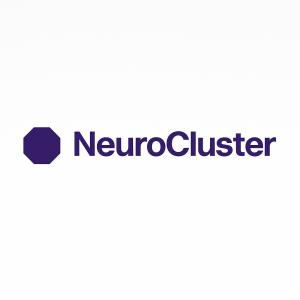NeuroCluster Announces AI Datacenter Platform with 5-Minute Deployment Capability
Dutch technology company's integrated platform reduces AI infrastructure setup time by 99% while maintaining European data residency.
EINDHOVEN, NETHERLANDS, June 6, 2025 /EINPresswire.com/ -- NEUROCLUSTER today announced the general availability of its AI datacenter infrastructure platform that enables complete AI environment deployment in five minutes, compared to the current industry standard of six weeks. The Netherlands-based company addresses European data sovereignty requirements while AI infrastructure investment is projected to exceed $1 trillion globally by 2028.The platform responds to current market conditions where AI datacenter supply constraints have driven colocation provider pricing up 35 percent between 2020 and 2023. NEUROCLUSTER's approach maintains 100% European Union data residency while addressing deployment speed challenges that organizations currently face when implementing AI infrastructure.
"European organizations need AI infrastructure that respects data sovereignty while delivering operational efficiency," said C.A.W. van Steenbergen, Founder and CEO of NEUROCLUSTER. "Our platform demonstrates that companies can achieve five-minute deployment timeframes without compromising regulatory compliance or security standards."
The integrated solution combines four distinct capabilities: modular AI infrastructure featuring MinIO storage, ClickHouse analytics, JupyterHub development environments, and GPU cluster management; AI pipeline automation using five proprietary algorithms that include Graph-Based Dependency Resolution; Business-in-the-Cloud virtual organization management with automated decision-making agents; and a global AI application marketplace with developer revenue sharing.
Van Steenbergen explains the platform's differentiation: "Integration distinguishes our approach from single-point solutions. Business-in-the-Cloud agents automate 80% of routine organizational decisions while the AI App Store provides developers with compliant distribution channels and revenue opportunities."
Market validation includes 50 beta customers across multiple sectors, generating €2.5 million in identified annual recurring revenue. A chief technology officer at a Dutch financial technology company reported: "NEUROCLUSTER reduced our AI infrastructure deployment from six weeks to two hours while enabling automated decision-making that handles the majority of routine operational choices."
Current market dynamics support NEUROCLUSTER's timing. Microsoft plans $80 billion in AI datacenter investments during fiscal 2025. Amazon and Nvidia executives have confirmed continued strong demand for AI datacenter capacity with growth projections indicating sustained expansion. NEUROCLUSTER's European-focused approach targets organizations prioritizing data sovereignty and regulatory compliance.
The company currently seeks €15 million in Series A funding to accelerate product development and expand internationally. Financial projections indicate €30 million annual recurring revenue by 2026 across the integrated platform portfolio, with potential growth to €500 million by 2029.
NEUROCLUSTER has filed comprehensive intellectual property protection through i-DEPOT registration for five proprietary AI pipeline generation methods. Patent applications are in progress for business agent communication protocols and multi-tenant security architecture innovations.
Founded in 2025 and headquartered in the Netherlands, NEUROCLUSTER integrates AI infrastructure, business automation, and application distribution capabilities. The company serves customers across 15 industry sectors including finance, healthcare, and manufacturing while ensuring European data sovereignty and regulatory compliance throughout its service delivery.
About NEUROCLUSTER
NEUROCLUSTER develops integrated AI infrastructure platforms that combine datacenter deployment, business automation, and application distribution. The company maintains European data residency standards while providing rapid deployment capabilities for organizations implementing AI infrastructure solutions.
Chris van Steenbergen
NeuroCluster
email us here
Visit us on social media:
LinkedIn
Legal Disclaimer:
EIN Presswire provides this news content "as is" without warranty of any kind. We do not accept any responsibility or liability for the accuracy, content, images, videos, licenses, completeness, legality, or reliability of the information contained in this article. If you have any complaints or copyright issues related to this article, kindly contact the author above.
Automotive Steel Market to Reach $145.8 Billion by 2029 with 5.3% CAGR
Relentless Visibility is the New Competitive Edge, New Study Shows
Veterinary API Manufacturing Market | Opportunities, Share, Growth & Competitive Analysis Forecast to 2029
Więcej ważnych informacji
 Jedynka Newserii
Jedynka Newserii

 Jedynka Newserii
Jedynka Newserii

Konsument

Wzrost sprzedaży piw bezalkoholowych idzie w parze z inwestycjami w zieloną energię. Kompania Piwowarska ogranicza ślad węglowy i wspiera lokalne inicjatywy
Kompania Piwowarska kontynuuję realizację strategii „Lepsza Przyszłość 2030”, w której łączy ambitne cele środowiskowe, edukacja konsumentów oraz rozwój segmentu piw bezalkoholowych z realnym wsparciem dla lokalnych społeczności. Firma, będąca liderem polskiego rynku piwa, ogranicza emisję CO₂, zwiększa udział opakowań zwrotnych i angażuje pracowników w wolontariat, w tym m.in. w pomoc dla ofiar powodzi na Dolnym Śląsku.
Handel
D. Joński: Europa musi chronić swój rynek poprzez cła i wysokie standardy bezpieczeństwa dla importowanych towarów. Powinniśmy budować własny przemysł oparty na tańszej energii

Tańsza energia, a przez to niższe koszty produkcji w Europie to jeden z kierunków, który wskazuje Unia Europejska w rywalizacji z tanimi towarami z Azji, głównie z Chin. Jednocześnie rynek Starego Kontynentu powinien być chroniony poprzez zbalansowane cła oraz wysokie standardy bezpieczeństwa stawiane importowanym produktom. Zdaniem europosła Dariusza Jońskiego ważne jest rozwijanie przemysłu w Europie bez względu na narodowość właścicieli. Relacje z Chinami muszą zostać na nowo zdefiniowane i przebiegać na równych zasadach.
Handel
Poprawia się jakość raportów dużych spółek giełdowych dotyczących zrównoważonego rozwoju. Pozostają też obszary do dopracowania

Ekspertki i eksperci z Deloitte’a przeprowadzili analizę ujawnień taksonomicznych spółek notowanych na Giełdzie Papierów Wartościowych, która objęła sprawozdania z działalności za rok 2024 w części dotyczącej zrównoważonego rozwoju. To trzeci rok ujawniania stopnia zgodności przedsiębiorstw z Taksonomią Unii Europejskiej, co przekłada się na zwiększoną jakość i porównywalność prezentowanych danych. Jednocześnie można oczekiwać, że inwestycje zgodne z Taksonomią będą coraz istotniejszym elementem strategii rozwoju przedsiębiorstw w kolejnych latach.
Partner serwisu
Szkolenia

Akademia Newserii
Akademia Newserii to projekt, w ramach którego najlepsi polscy dziennikarze biznesowi, giełdowi oraz lifestylowi, a także szkoleniowcy z wieloletnim doświadczeniem dzielą się swoją wiedzą nt. pracy z mediami.









.gif)

 |
| |
| |
|